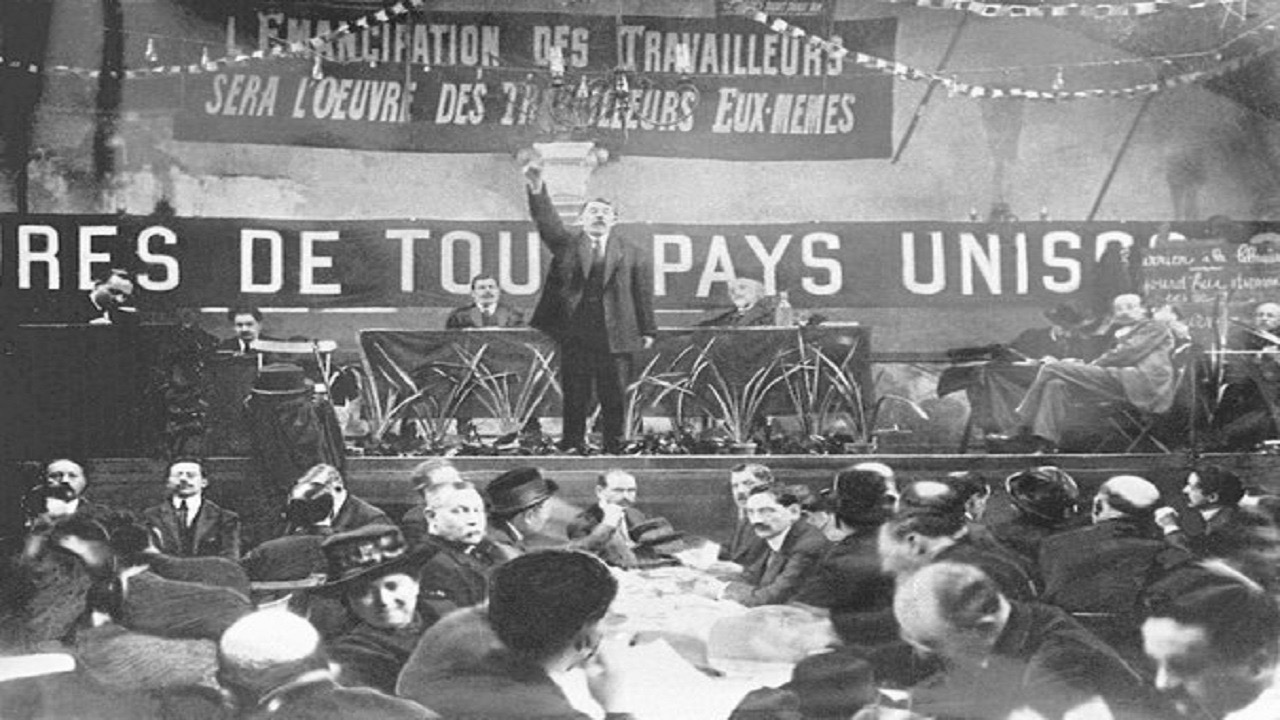On December 30, 1920, the 18th national congress of the Socialist Party-French Section of the Workers’ International (SFIO) was held in Tours which saw the birth of the organized communist movement in France. After two months of discussions between the SFIO members, the majority of delegates decided to join the Third International or the Communist International (Comintern), which was created in 1919 and lasted till 1943. The Socialist Youth in France had already made the choice to join the Communist Youth International a few months before the SFIO congress.
There were three different views within SFIO on joining the Comintern. The first was proposed by the secretary general of the SFIO, Ludovic-Oscar Frossard, and its new director of L’Humanité, Marcel Cachin, who called for unconditional membership of the Comintern. The second group, led by the Seine MP Léon Blum, was the ‘socialist resistance committee’ which refused to join it in the name of ‘international unity’. The third group was of the ‘reconstructors’ who were in favor of Comintern membership but under certain conditions. It was led by Karl Marx’s grandson, lawyer Jean Longuet. Ultimately, the motion proposed by Frossard-Cachin won the support of the majority of sections, federations and congress participants.
The congress decided to go for membership of the Comintern with 3,252 votes in favor against 1022. Following the vote, the ‘resistance’ and the ‘reconstructors’ left the conference, resulting in a split between the French socialists. The congress continued as the ‘communist congress’ until the next day.
In this way, “from the ruins of French social democracy, a new party was born, the French Section of the Communist International (SFIC).” In the spring of 1921, the SFIC – the pro-communist section of SFIO – took the name of the Communist Party-French Section of the Communist International (PC-SFIC) in an administrative congress held in Paris between May 15-17. The anti-communist minorities in the SFIO decided to continue on as the SFIO and joined the Socialist Workers International, established in 1923 (known as the Union of Vienna or International Two and a Half).
The congress of Tours had not resolved all the political problems within the SFIC. Political clashes between the right, left, and center wings did occur. The Comintern supported the left wing, made up mainly of young communist leaders like Paul Vaillant-Couturier.
The PC-SFIC opposed the anti-workers policies and the imperialist maneuvers pursued by the right-wing National Bloc government (1919-1924) in the French colonies. Numerous strikes broke out in France in February 1921, particularly in the textiles sector.
The reformist leadership of the General Confederation of Labor (CGT) did not support the radical uprising of the workers. After a purge of the communist elements from its ranks in December 1921, the General Confederation of Unitary Labor (CGTU) was formed around trade unionists close to the SFIC. It joined forces with the Red Trade Union International and achieved its membership in 1922. The CGT thus went down from having 2.5 million members to around 900,000 in a few months.
The communists fiercely opposed the National Bloc’s imperialist coercion against Germany for the payment of heavy indemnities. They also opposed the French army’s invasion of Saar in 1921 and Ruhr in 1923. The PC-SFIC began the first major campaign against such imperialist maneuvers. The slogans of proletarian internationalism gained much traction within the French working class and sections of the French army as well. This provoked the government to unleash a fierce repression of the communists and the unionists of the CGTU.
In the legislative elections that took place on May 11 and 25, 1924, the PC-SFIC won 875,812 votes (9.82%) and 26 MPs. This reflected the party’s influence and the consolidation of its support base. The PC-SFIC scored its best performances in the workers-dominated areas of Paris, Seine, Oise, the lower Seine, and the north region. The PC-SFIC also won seats in the departments of Cher and Lot-et-Garonne by making inroads with the French peasantry.
(Nicolas Maury is a blogger at Perspective Communiste and a member of the French Communist Party)





